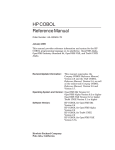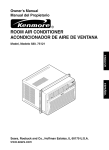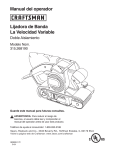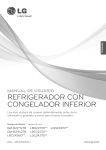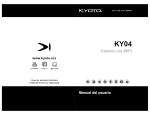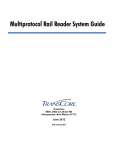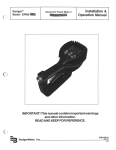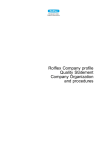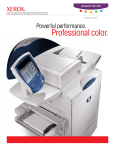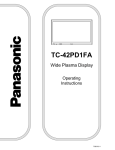Download GBC 620OS User's Manual
Transcript
GBC 620os Operation Manual GBC 620os INSTALLATION & OPERATING MANUAL Part Number 930-145, Rev A. © 2007 General Binding Corporation GB Operating Instructions I Istruzioni per l'Uso D Bedienungsanleitungen NL Gebruiksaanwijzing F Mode d'Emploi E Instrucciones de Operación Page 1 GBC 620os Operation Manual GB The information in this publication is provided for reference and is believed to be accurate and complete. General Binding Corporation (GBC) is not liable for errors in this publication or for incidental or consequential damage in connection with the furnishing or use of the information in this publication, including, but not limited to, any implied warranty of fitness or merchantability for any particular use. GBC reserves the right to make changes to this publication and to the products described in it without notice. All specifications and information concerning products are subject to change without notice. Reference in this publication to information or products protected by copyright or patent does not convey any license under the rights of GBC or others. GBC assumes no liability arising from infringements of patents or any other rights of third parties. This publication is copyrighted © 2006 by GBC. All rights reserved. The information contained in this publication is proprietary and may not be reproduced, stored, transmitted, or transferred, in whole or in part, in any form without the prior and express written permission of GBC. I Le informazioni contenute in questo documento sono fornite a titolo di referenza e sono considerate corrette e complete. General Binding Corporation (GBC) no si responsabilizza di eventuali errori contenuti in questo documento, né di danni incidentali o conseguenti relazionati con la fornitura e l’uso delle informazioni in questo documento, includendo senza limitazioni qualsiasi garanzia d’idoneità o commerciabilità per qualsiasi uso particolare. GBC si riserva il diritto di effettuare cambi a questo documento e ai prodotti in esso descritti senza preavviso. Tutte le specifiche e le informazioni sui prodotti sono soggette a cambio senza preavviso. In questo documento le referenze a informazioni e prodotti protetti da diritti di proprietà intellettuale o brevetti non trasferiscono nessuna licenza alla quale abbiano diritto GBC o altri. GBC non assume nessuna responsabilità derivante dalla violazione di brevetti o di qualsiasi altro diritto di terzi. Copyright © 2006 Questo documento è soggetto ai diritti di proprietà intellettuale di GBC. Riservati tutti i diritti. Le informazioni contenute in questo documento sono di proprietà esclusiva e non possono essere riprodotte, conservate, trasferite, in tutto o in parte ed in modo alcuno, senza la previa autorizzazione espressa e per iscritto di GBC. D Die Informationen in dieser Druckschrift werden als Richtlinien zur Verfügung gestellt und sind unseres Wissens richtig und vollständig. General Binding Corporation (GBC) lehnt jede Haftung für Fehler in dieser Druckschrift sowie für Schadenersatz oder Folgeschäden im Zusammenhang mit der Bereitstellung oder Verwendung der hierin enthaltenden Informationen ab, ein- aber nicht ausschließlich die Gewährleistung für Eignung und handelsübliche Qualität für einen bestimmten Zweck. GBS behält sich das Recht vor, diese Druckschrift und die darin beschriebenen Produkte ohne Vorankündigung zu ändern. Alle die Produkte betreffenden Leistungsbeschreibungen und Informationen können jederzeit ohne Vorankündigung geändert werden. Durch die Bezugnahmen in dieser Druckschrift auf urheberrechtlich oder durch ein Patent geschützte Informationen oder Produkte werden keine Rechte von GBC oder Dritten übertragen. GBC lehnt jede Haftung für Patentverletzungen sowie für die Verletzung anderer Rechte von Dritten ab. Diese Druckschrift ist durch GBC urheberrechtlich geschützt (© 2006). Alle Rechte vorbehalten. Die Informationen in dieser Druckschrift sind gesetzlich geschützt und dürfen ohne vorherige und ausdrückliche schriftliche Genehmigung von GBC in keiner Weise weder ganz noch teilweise vervielfältigt, aufbewahrt, weiter verbreitet oder übertragen werden. NL De informatie in deze publicatie geldt slechts ter verwijzing en wordt nauwkeurig en volledig geacht. General Binding Corporation (GBC) is niet aansprakelijk voor fouten in deze publicatie of voor incidentele of voortvloeiende schade in verband met het verschaffen of gebruik van de informatie in deze publicatie, inclusief, maar niet beperkt tot stilzwijgende garanties van geschiktheid voor een bepaald doel of verkoopbaarheid. GBC behoudt zich het recht voor om zonder voorafgaande kennisgeving wijzigingen te maken in deze publicatie en in de producten die hierin worden beschreven. Alle specificaties en informatie m.b.t. producten kunnen zonder voorafgaande kennisgeving gewijzigd worden. Verwijzingen in deze publicatie naar informatie of producten beschermd door copyrights of patenten houdt geen licenties onder de rechten van GBC of anderen in. GBC is niet aansprakelijk voor schendingen van patenten of andere rechten van derden. De publicatie is auteursrechtelijk beschermd, copyright © 2006 door GBC. Alle rechten voorbehouden. De informatie in deze publicatie is eigendom van GBC en mag niet verveelvuldigd, opgeslagen, overgebracht of overgedragen worden, geheel of gedeeltelijk, in welke vorm dan ook zonder voorafgaande en uitdrukkelijke schriftelijke toestemming van GBC. F L’information contenue dans cette publication est fournie à titre de référence et elle est considérée exacte et complète. General Binding Corporation (GBC) n’est pas responsable des erreurs contenues dans cette publication ni des dommages indirects ou consécutifs portant sur l’utilisation ou la présentation de l’information de ce document, y compris, mais sans s’y limiter, toute garantie implicite de commercialité ou d’adaptation à un usage particulier. GBC se réserve le droit d’apporter des modifications à cette publication et aux produits qui y sont décrits sans préavis. Toutes les spécifications et l’information au sujet des produits sont sujettes à changements sans préavis. Toute référence à l’information ou aux produits protégés par un droit d’auteur ou un brevet présentée dans ce document ne porte aucune licence sous les droits de GBC ou d’autres parties. GBC n’assume aucune responsabilité découlant de contraventions aux brevets ou à tout autre droit de tierces parties. Cette publication est protégée par un droit d’auteur © 2006 de GBC. Tous droits réservés L’information contenue dans cette publication est privative et ne peut pas être reproduite, mise en mémoire, transmise ou transférée, en partie ou en entier, sous quelque forme que ce soit sans la permission écrite préalable et expresse de GBC. E La información contenida en esta publicación es proporcionada a título de referencia y se considera que es precisa y completa. General Binding Corporation (GBC) no es responsable por errores contenidos en esta publicación o por daños consecuentes o incidentales relacionados con la disponibilidad o el uso de la información en esta publicación, incluyendo y sin limitarse a, cualquier garantía de aptitud y comerciabilidad para cualquier uso específico. GBC se reserva el derecho de hacer cambios en esta publicación y a los productos descritos en la misma sin aviso previo. Todas las características y la información referente a los productos, están sujetas a cambios sin aviso previo. Las referencias en esta publicación a información o productos protegidos por derechos de propiedad intelectual o por patentes no otorga ninguna licencia amparada por los derechos de GBC u otros. GBC no asume ninguna responsabilidad que se derive de la violación de patentes u otros derechos de terceras partes. Copyright © 2006 Esta publicación está amparada por derechos de propiedad intelectual de GBC. Todos los derechos reservados. La información contenida en este documento es de propiedad exclusiva y no puede reproducirse, almacenarse, transmitirse o transferirse, en su totalidad o en partes, y de ninguna manera, sin la autorización previa y por escrito de GBC. GB © 2007 General Binding Corporation Page 2 GBC 620os Operation Manual TABLE OF CONTENTS Description Cover Legal Disclaimer Table of Contents Important Safety Instructions Important Safeguards General ,Electric & Service Warranty Specifications Pre- Installation Installation Control Guide Page No. 1 2 3 4 4 5 5 6 6 7 Control Panel Display Speed Adjustment Knob Load Reverse Stop Run Length Burst Heat Reset Master Control Knob Burst On/Off Fan Burst Speed 7 7 7 7 7 7 7 7 7 7 7 7 7 7 Front Control Guide LCD Display HEAT WAIT BURST SPD LENGTH SHEET COUNT H-ERR 8 8 8 8 8 8 8 Features/Accessories Guide Emergency stop Front safety shield interlock latches Front safety shield Rewinder Feed gate Feed belts Table side guides Burst roller gap adjustment knob Decurling adjustment knob Feed indicator led Feed gate stops In-line slitters Cooling tube Guide ruler Idler bar Lower main roller Top main Teflon heat roller © 2007 General Binding Corporation 9 9 9 9 9 9 9 9 9 9 9 9 9 9 9 10 10 10 Description Burst roller pressure gauge Burst roller pressure gauge knob Nip roller pressure gauge Nip roller pressure gauge knob Serial number plate Main off/on switch Fuses Power cord Locking pins Film shaft latch Main film perforator wheel Film core chucks Film supply shaft Top film idler Pull rollers Skew wheel Skew wheel tension adjustment Skew wheel lock downs In line perforator wheel Perforator wheel lock down Feed belts Paper guides Rear safety latches Rear safety shield Rear table Bursting rollers Rear table latches Film tension knob Slitter film rewinder knob Media table Media table handle Compressor output hose Compressor plug Compressor air regulator Compressor on/off Page No. 10 10 10 10 10 11 11 11 11 11 11 11 11 11 12 12 12 12 12 12 12 12 12 12 12 13 13 13 13 13 13 13 13 13 13 Loading Film and Threading Film 14 Slitting Film 18 Speed/Temperature Control 19 The Art of Lamination Basic Rules Film Tension 19 19 20 Output Troubleshooting Maintenance 21 22 Page 3 GBC 620os Operation Manual IMPORTANT SAFETY INSTRUCTIONS YOUR SAFETY AS WELL AS THE SAFETY OF OTHERS IS IMPORTANT TO GBC. IN THIS INSTRUCTION MANUAL AND ON THE PRODUCT, YOU WILL FIND IMPORTANT SAFETY MESSAGES REGARDING THE PRODUCT. READ THESE MESSAGES CAREFULLY. READ ALL OF THE INSTRUCTIONS AND SAVE THESE INSTRUCTIONS FOR LATER USE. THE SAFETY ALERT SYMBOL PRECEDES EACH SAFETY MESSAGE IN THIS INSTRUCTION MANUAL. THE SYMBOL INDICATES A POTENTIAL PERSONAL SAFETY HAZARD TO YOU OR OTHERS. THE FOLLOWING WARNINGS ARE FOUND UPON THIS PRODUCT. ADVERTENCIA Riesgo de choque eléctrico No abra: Adentro no hay piezas reparables por el usuario. Mantenimiento solamente por personal calificado Attention Avertissement Risque de Secousseélectrique. Ne pas ouvrir. Pas de pièces réparables par l'utilisateur. Entretien seulement par personnel qualifié. Electrical shock hazard. Do not open. No user serviceable parts inside. Refer servicing to qualified service personnel. THIS SAFETY MESSAGE MEANS THAT YOU COULD BE SERIOUSLY HURT OR KILLED IF YOU OPEN THE PRODUCT AND EXPOSE YOURSELF TO HAZARDOUS VOLTAGE. ADVERTENCIA RODILLOS CALIENTES. PUNTO DE PINCHAMIENTO. Mantener manos y ropa a distancia. Attention ROULEAUX CHAUDS. POINT DE PINCEMENT. Tenir mains et vêtements à l'écart. ADVERTENCIA PINCH POINT. Keep hands and clothing away. Mantener manos y dedos a distancia. Attention LAME COUPANTE. Tenir mains et doigts à l'écart. WARNING: TO GUARD AGAINST INJURY THE FOLLOWING SAFETY PRECAUTIONS MUST BE OBSERVED IN INSTALLATION AND USE OF THE LAMINATOR. General: Keep hands, long hair, loose clothing, and articles such as necklaces or ties away from the front of the heat and pull rollers to avoid entanglement and entrapment. The heat roller can reach temperatures over 300˚F (150°C). Avoid contact with the heat roller during operation or shortly after power has been removed from the laminator. Keep hands and fingers away from the path of the sharp film cutter blades, feed belts and rollers. Do not use the laminator for other than its intended purpose. Avoid moving the Laminator on uneven floor surfaces. Never tilt the laminator. Do not defeat or remove electrical and mechanical safety equipment such as interlocks, shields and guards. Do not insert objects unsuitable for laminating or expose the equipment to liquids. When moving the laminator on a cart or stand, avoid quick stops, excessive force and uneven surfaces. Any concerns for safety should be brought to the attention of your local service representative immediately. Avertissement HOT ROLLS. THIS SAFETY MESSAGE MEANS THAT YOU COULD BE BURNED AND YOUR FINGERS COULD BE TRAPPED AND CRUSHED IN THE HOT ROLLERS. CLOTHING, JEWELRY AND LONG HAIR COULD BE CAUGHT IN THE ROLLERS AND PULL YOU INTO THEM. NAVAJA FILOSA. IMPORTANT SAFEGUARDS Electrical: The Laminator should be connected only to a source of power as indicated in these instructions and on the serial plate located on the rear of the laminator. Contact an electrician should the attachment plug provided with the Laminator not match the receptacles at your location. WARNING: THE RECEPTACLE MUST BE LOCATED NEAR THE EQUIPMENT AND EASILY ACCESSIBLE. Avertissement SHARP BLADE. Keep hands and clothing away. THIS SAFETY MESSAGE MEANS THAT YOU COULD CUT YOURSELF IF YOU ARE NOT CAREFUL. WARNING: THIS SAFETY ALERT SYMBOL PRECEDES EACH SAFETY MESSAGE IN THIS INSTRUCTION MANUAL. THE SYMBOL INDICATES A POTENTAL PERSONAL SAFETY HAZARD TO YOU OR OTHERS. WARNING: DO NOT ATTEMPT TO SERVICE OR REPAIR THE 2064 WF LAMINATOR. WARNING: DO NOT CONNECT THE LAMINATOR TO AN ELECTRICAL SUPPLY OR ATTEMPT TO OPERATE THE LAMINATOR UNTIL YOU HAVE COMPLETELY READ THESE INSTRUCTIONS. MAINTAIN THESE INSTRUCTIONS IN A CONVENIENT LOCATION FOR FUTURE REFERENCE. © 2007 General Binding Corporation Do not operate the Laminator with a damaged power supply cord or attachment plug, upon occurrence of a malfunction, or after the laminator has been damaged. Contact GBC’s Technical Service Department or your dealer/distributor for assistance. Service: Perform only the routine maintenance procedures referred to in these instructions WARNING: DO NOT ATTEMPT TO SERVICE OR REPAIR THE LAMINATOR Disconnect the plug from the receptacle and contact GBC’s Technical Department or your dealer/distributor when one or more of the following has occurred. • The power supply cord or attachment plug is damaged. • Liquid has been spilled into the laminator. • The laminator is malfunctioning after being mishandled. • The laminator does not operate as described in these instructions. Page 4 GBC 620os Operation Manual WARRANTY Limited 90- Day Warranty GBC warrants to the original purchaser for a period of ninety days on labor and one year on parts after installation that this laminator is free from defects in workmanship and material under normal use and service. GBC’s obligation under this limited warranty is limited to replacement or repair, at GBC’s option, of any part found defective by GBC without charge for material or labor. THIS LIMITED WARRANTY IS IN LIEU OF ALL OTHER WARRANTIES EXPRESSED OR IMPLIED. WARRANTIES OF MERCHANTABILITY OR FITNESS FOR A PARTICULAR PURPOSE ARE EXPRESSLY EXCLUDED. ANY REPRESENTATIONS OR PROMISES INCONSISTENT WITH, OR IN ADDITION TO, THIS LIMITED WARRANTY ARE UNAUTHORIZED AND SHALL NOT BE BINDING UPON GBC. IN NO EVENT SHALL GBC BE LIABLE FOR ANY SPECIAL, INCIDENTAL, OR CONSEQUENTIAL DAMAGES, WHETHER OR NOT FORESEEABLE. This limited warranty shall be void if the laminator has been misused; mishandled; damaged by negligence, by accident, during shipment, or due to exposure to extreme conditions; repaired, altered, moved, or installed by anyone other than GBC or its authorized agents; or if incompatible film was used. GBC’s obligation under this limited warranty does not include routine maintenance, cleaning, adjustment, normal cosmetic or mechanical wear, or freight charges. Without limiting the generality of the previous paragraph, GBC’s obligation under this limited warranty does not include: 1. Damage caused to the rollers by knives, razors, or other sharp tools: by any foreign objects falling into the working area of the laminator; or by cleaning the laminator with solutions or materials that harm its surfaces; 2. Damage caused by adhesives; nor 3. Damage caused by lifting, tilting or attempting to position the laminator other than rolling it on its castors across even surfaces. FOR EUROPEAN UNION RESIDENTS ONLY: This guarantee does not affect the legal rights which consumers have under applicable national legislation governing the sale of consumer goods. SPECIFICATIONS Operating Speed: Maximum Temperature: Minimum Sheet size. Max Width: Max Length: Maximum Film Width: Max. Film Diameter: Film Types Used: Core Size: Max. Nip Opening: Roller Design: Dimensions (W x D x H) (With Cabinet) Weight: Electrical Requirements: Laminator/ Compressor FCC NOTE Up to 45-fpm (12 mpm) MAX 300°F (150°C) 4 inches (101 mm) W x 10 inches (254mm) Long 21 inches. (533mm) 30 inches. (762mm) 21 in. (162.5 cm) OPP, PET, Nylon. NOTE: “Poly-out films not recommended.” 3 Inch Core 1/8th inch Teflon Heated Roller and Silicone Rubber Nip Roller Unit alone: (Uncrated) 47 inches (W) x 88 inches (L) x 53 inches (H). (1193mm x 2235mm x 1346mm.) Unit alone: 671 lb (304 Kg). Shipping: 792 lb (359 Kg). Refer to the serial plate located on the rear of the laminator for the specific electrical ratings. (Laminator) 220V, 12.4 Amps, 60 HZ. Single Phase. 2800W. (Compressor) 220VAC, 1.2 Amps. FCC Class A Notice - Notification pour les Etats-Unis Note: This equipment has been tested and found to comply with the limits for a Class A digital device, pursuant to part 15 of the FCC rules. These limits are designed to provide reasonable protection against harmful interference when the equipment is operated in a commercial environment. This equipment generates, uses, and can radiated radio frequency energy and, if not installed and used in accordance with the instruction manual, may cause harmful interference to radio communications. Operation of this equipment in a residential area is likely to cause harmful interference in which case the user will be required to correct the interference at their own expense. Canada Class A Notice - Avis Canada, Class A This Class A digital apparatus complies with Canadian ICES-003. Cet appareil numérique de la classe A est conforme à la norme NMB-003 du Canada. Modifications Any modifications made to this device that are not approved by General Binding Corporation may void the authority granted to the user by the FCC and/or by Industry Canada to operate this equipment. Toutes modifications apportées à ce dispositif et non approuvées par General Binding Corporation annuleront le droit accordé à l'utilisateur par le FCC et/ou par Industrie Canada de faire fonctionner cet équipement. © 2007 General Binding Corporation Page 5 GBC 620os Operation Manual PRE-INSTALLATION Before a 620os Laminator can be installed, ensure the following requirements are met: 1. 2. 3. 4. Are doorways and hallways wide enough for the laminator to be moved to the installation site? Is there ample room for the laminator? • A work area must be established that allows for operation in both the front and rear of the laminator and provides space for efficient material flow. Is the environment appropriate for the laminator? • The laminator requires a clean, dust and vapor free environment to operate properly. • Avoid locating the laminator near sources of heat or cold. Avoid locating the laminator in the direct path of forced, heated or cooled air. CAUTION: Air flow can cause uneven heating / cooling of the rollers and result in poor output quality. Have you contacted a certified electrician to wire the receptacle and ensure that adequate power is being supplied, having the appropriate capacity, over current protection and safety lockouts available? GBC 620os Requires: • 220V at 60Hz with 20 Amps single phase. • Nema 6-15 P 15 A 250 V Receptacle • A Buck Booster may be needed if voltage is not correct. Please contact a licensed electrician to install if needed. This Machine is supplied with a Nema 6-15 male Plug. INSTALLATION 1. 2. 3. 4. 5. 6. Note: Shipping damage should be brought to the immediate attention of the delivering carrier. With assistance, carefully roll the laminator into position over flat and even surfaces. The laminator should be positioned to allow exiting film to flow freely to the floor or a work table. Accumulation of laminate immediately behind the laminator as it exits the equipment may cause the film to wrap around the pull rollers, resulting in a “jammed” condition. Avoid locating the laminator near sources of heat or cold. Avoid locating the laminator in the direct path of forced, heated or cooled air. Once the laminator has been properly positioned, lock the castors in place. Locking the castors prevent the machine from rolling during set up, operation or servicing. Connect the attachment plug provided with the laminator to a suitably grounded outlet. Avoid connecting other equipment to the same branch circuit to which the laminator is connected, as this may result in nuisance tripping of circuit breakers or blowing fuses. Machine must be leveled to ensure best performance. Level the machine by lowering both the main and pull rollers. Lay a level on top of the main and pull rolls. Then, check level from main roll to pull roll on right and left side of the roll. Finally, check by placing the level diagonally across lower main to lower pull rolls. © 2007 General Binding Corporation Page 6 GBC 620os Operation Manual FRONT CONTROL GUIDE Figure 1 A. LCD Display: • The LCD will display the settings the machine is currently set for. • Illuminates when the laminator is plugged in and POWER ON/OFF is in the on, (I), position. Displays settings for the top heater, speed, Burst, and ready/wait. B. MOTOR SPEED: • When pressed, permits increasing or decreasing of speed by turning the MOTOR SPEED and is indicated on the control panel display. Range is 1-15. The number does not stand for Feet/Minute. 15=40Feet/Minute. C. LOADING: • When pressed, permits the operator to run product into the heat roll for the purpose of threading the film. D.REVERSE: • When pressed, and held, reverses the rollers direction to clear film jams. E. STOP: • When pressed, the machine will stop and the rollers will not rotate. The rollers will also rise to the up position. F. RUN: • When pressed, the machine will activate the rollers for normal operation. G. LENGTH: • You can enter your paper length by pressing LENGTH then turning the MASTER DIAL to the desired paper size. H. BURST: • You can determine where and when you want to activate the Burst Rollers by pressing BURST and changing the value displayed on the LCD by rotating the MASTER DIAL. Values displayed range from 580-660. A decal is located between the Main Rollers and the Bursting Rollers to determine what value is desired. I. HEAT: • When pressed, permits increasing or decreasing of the temperature by turning the MASTER DIAL and is indicated on the control panel display. Range is 32°F-302°F. J. Reset Button: • L. BURST ON/OFF: • To activate the Burst Roller for sheet separation, press the BURST ON/OFF. M. FAN ON/OFF: • When pressed, turns on the cooling fan. When pressed again, turns off the cooling fan. N. BURST SPEED: • When BURST SPEED pressed, the RPM’s of the Burst Rollers will increase helping to Burst or Snap stronger films such as Digital Lay Flat. This is a pre-set speed and can not be changed. Figure 1 On the LCD, the sheet count will appear indicating how many sheets were run through the machine. By pressing RESET, the operator and clear this value returning the count to “0”. K. MASTER DIAL: • Increases (+) or decreases (-) the numeric value for the selected setting when turned. © 2007 General Binding Corporation Page 7 GBC 620os Operation Manual FRONT CONTROL GUIDE Figure 2 LCD Display: • HEAT: This displays the Temperature the machine is set at. Figure 2. indicates the set temperature is 32*F. To read the actual temperature of the Heat Roller, press and hold the MASTER DIAL. (See Figure 1.) • WAIT: After setting the desired temperature, the LCD will display “WAIT” until the temperature reaches the set point. After the machine reaches the set point, the LCD will read “READY” and the operator can start running the machine. • BURST: The Burst value tells the laminator when and where to activate the Burst Roller. A decal located on the side frame between the pull rollers and the Bursting Roller reflects values from a range of 580-660. To change the location of the burst, press the BURST then turn the MASTER DIAL to dial in the desired value in relation to the decal on the side frame. • SPD: The Abbreviation “SPD” refers to the set speed of the machine. The range of speed is 115. At speed 01, the machine will run approximately 3ft/mn. Each increment is equal to about 3ft/mn. SPD 15 is 45ft/mn. To adjust this value, use MOTOR SPEED. Figure 1. • LENGTH: The value displayed next to length refers to the sheet size of the media being used. In Figure 2. the medias sheet length is 18 inches. To adjust the length, press LENGTH and use the MASTER DIAL to increase or decrease your sheet size. The sheet size ranges from 8 inches30inches and increases by 1/32nd increments. • SHEET COUNT: Sheet count will indicate how many sheets of media were run through the laminator. To reset the counter to “0”, press RESET shown in Figure 1. © 2007 General Binding Corporation Figure 3 • HEAT: (Figure 3.) After setting the Heat Roller temperature, the laminator is protected with heat sensor protection. In the event that the IR Sensor fails, or a foreign object such as a misfeed image blocks the IR Sensor, the IR Sensor will detect a sudden/drastic change in temperature and an alarm will sound and “H-Err” will appear on the LCD. Stop the laminator by pressing STOP, locate the IR Sensor, (Refer to Know Your Laminator Section) and clear the image from the path of the IR Sensor. Rest the alarm by pressing the MASTER DIAL. (Figure 1.) At this time, simply press RUN and continue the job. Page 8 GBC 620os Operation Manual FEATURES/ACCESORIES GUIDE Refer to the following pages for detailed information on the Features. EMERGENCY STOP BUTTONS (Fig. 1– Item A) There are two EMERGENCY STOPS on the laminator. One is located at the rear of the machine and the other is located on the front. To engage, press any EMERGENCY STOP to stop the roller movement. To disengage, turn the EMERGENCY STOP clockwise after the emergency condition has been resolved. Figure 1 FRONT SAFETY SHIELD INTERLOCK LATCHES (Fig.1-Item B) The Front Safety Shield Interlock Latches ensures that the Front Safety Shield is inserted properly and if not engaged, the machine will not operate. FRONT SAFETY SHIELD (Fig.2-ItemC) The Front Safety Shield prevents entanglement, entrapment, and inadvertent contact with the Heat Roller. REWINDER (Fig.2-ItemD) The Rewinder is used to take up any film that is being slit via the In-Line Slitters. Figure 2 FEED GATE (Fig.2-ItemE) The Feed Gate controls the images entering the Nip. It will activate according to the paper size selected on the display, and give an even and accurate overlap. FEED BELTS (Fig.2-ItemF) The Feed Belts move the images into the Feed Gate and then into the nip. TABLE SIDE GUIDES (Fig.2-ItemG) The Table Side Guides are adjustable to ensure accurate feeding. Figure 3 BURST ROLLER GAP ADJUSTMENT KNOB (Fig.3-ItemH) The Burst Roller Gap Knob raises and lowers the Burst Roller. Depending on the media and film being used, the operator can raise or lower the Burst Roller to assist in the Burst or Snapping of the images. DECURLING ADJUSTMENT KNOB (Fig.3-ItemI) The Decurling Adjustment Knob is used in conjunction with the film shaft brake to increase or decrease the amount of curl desired by the operator. The Decurling Bar is located between the Main Rolls and the Pull Rolls. FEED INDICATOR LED (Fig.4-ItemJ) The Feed Indicator LED will indicate when the next sheet can be placed on the Feed Table. Sheets should not be placed until the LED is illuminated. Figure 4 © 2007 General Binding Corporation FEED GATE STOPS (Fig.4-ItemK) The Feed Gate Stops can be adjusted up, down, and left to right to accommodate various media paper thicknesses. Page 9 GBC 620os Operation Manual FEATURES/ACCESORIES GUIDE IN-LINE SLITTERS (Fig. 5– Item L) The In-Line Slitters allows the operator to slit film before it passes through the Main Rollers. The trimmed waste can then be attached to the Rewinder Tube and disposed of later. COOLIN TUBE (Fig. 5– Item M) The Cooling Tube gives the operator the option of cooling the media after it passes through the Main Rolls. This can be activated on the Main Display Panel. Figure 5 GUIDE RULER (Fig. 5– Item N) The Guide Ruler helps the operator align the Slitter Blades accurately and helps align images to the film. IDLER BAR (Fig. 5– Item O) The Idler Bar is used to give the film more dwell time over the Heat Roller. It also assists in smoothing out the film before it enters the Nip. Figure 6 NIP ROLLER (Fig. 6– Item P) The Nip Roller is a silicone roll and does not heat up. The Main Heat Roller is lowered onto the Nip Roller to create pressure needed for laminating. MAIN HEAT ROLLER (Fig. 6– Item Q) The Main Heat Roller is Teflon coated & heats up to the desired set temperature activating the film for lamination. Figure 7 BURST ROLLER PRESSURE GAUGE (Fig. 7– Item R) The Burst Pressure Gauge indicates how much PSI is being supplied to the Burst Rollers. Different gages of paper may require changes to the pressure of the Burst Roller. BURST ROLLER PRESSURE GAUGE KNOB (Fig. 7– Item S) The Burst Roller Pressure Knob allows the operator to increase or decrease the amount of PSI supplied to the Burst Roller. NIP ROLLER PRESSURE GAUGE (Fig. 8– Item T) The Nip Roller Pressure Gauge indicates how much PSI is being supplied to the Main Heat Roller and Pull Rollers. Different gages of paper may require changes to the pressure of the Main Heat Roller. Figure 8 © 2007 General Binding Corporation NIP ROLLER PRESSURE GAUGE KNOB (Fig. 8– Item U) The Nip Roller Pressure Knob allows the operator to increase or decrease the amount of PSI supplied to the Nip Rollers, and the Pull Rollers. Page 10 GBC 620os Operation Manual FEATURES/ACCESORIES GUIDE V W X NOMENCLATURE PLATE (Fig. 9– Item V) The Nomenclature Plate provides the operator the necessary Technical information such as Voltage, Amperage, Wattage, Model Number and Serial Number. MAIN ON/OFF SWITCH (Fig. 9– Item W) The Main On/Off Switch supplies power or removes power from the machine. FUSES (Fig. 9– Item X) The Fuses protect internal PCB’s and motors. Y Figure 9 POWER CORD (Fig. 9– Item Y) The Power Cord plugs into the Main Power source or outlet. See (Machine Specs for plug requirements.) LOCKING PINS (Fig10– Item Z) The Locking Pins secure the Film Shaft Latch. A1 Z PRELAMINATING FILM PERFEORATOR WHEEL (Fig. 11– Item B1) The Prelaminating Film Perforator Wheel pierces small holes into the film to ensure controlled snapping or separating of images. Figure 10 B1 C1 FILM CORE CHUCKS (Fig. 11– Item C1) The Film Core Chucks secure the film onto the Supply Shaft. E1 D1 FILM SHAFT LATCH (Fig. 10– Item A1) The Film Shaft Latch secures the Supply shaft ensuring that the film is supported and enters the nip accurately. FILM SUPPLY SHAFT (Fig. 11– Item D1) The Film Supply Shaft accepts a 3 inch Core Chuck. The two Core Chucks slide onto the Film Supply Shaft, supporting the film being used. The Film Supply Shaft has a ruler adhered to the shaft for ease and accuracy when aligning the film and medias. Figure 11 TOP FILM IDLER (Fig. 11– Item E1) The Top Film Idler guides the film through the nip giving the film adequate film dwell time. © 2007 General Binding Corporation Page 11 GBC 620os Operation Manual FEATURES/ACCESORIES GUIDE PULL ROLLERS (Fig. 12– Item F1) The Pull Rollers are silicone driven rollers that pull the film and media through the machine and into the Bursting Rollers. SKEW WHEEL (Fig. 12– Item G1) For proper “snapping” of images, the out put must have a “skew” in the paper or a raised “tent” on one side of the output. By adjusting the Skew Wheel, you can adjust the amount of “Skew” or “Tent” needed for proper “snapping”. Figure 12 SKEW WHEEL PRESSURE ADJUSTMENT (Fig. 12– Item G2) The Skew Wheel Pressure Adjustment can be made by turning the screw down for more pressure and up for less. SKEW WHEEL LOCK DOWNS (Fig. 12– Item G3) The Skew Wheel Lock Downs secure the Skew Wheel to the shaft. These are used to relocate the Skew Wheel as needed. IN LINE PERFORATOR WHEEL (Fig. 12– Item H1) The In Line Perforator Wheel “perfs” the edge of the film allowing the images to be “snapped” or “separated”. PERFORATOR WHEEL TENSION ADJUSTMENT (Fig. 12– Item H2) The Perforator Wheel Tension Adjustment can be made by turning the screw. Figure 13 PERFORATOR WHEEL LOCK DOWN (Fig. 12– Item H3) The Perforator Wheel Lock Down secures the Perforator Wheel to the shaft. This is used to relocate the Perforator Wheel as needed. OUTPUT FEED BELTS (Fig. 12– Item I1) The Output Feed Belts assist the finished images into the Burst Rollers. PAPER GUIDES (Fig. 13– Item J1) The Paper Guides catch and orientate the finished images. Figure 14 REAR SAFETY LATCHES (Fig. 13– Item K1) The Rear Safety Latches lock the Rear Safety Shield into place. REAR SAFETY SHIELD (Fig. 13– Item L1) The Rear Safety Shield protects the operator from harm. REAR TABLE (Fig. 13– Item M1) The Rear Table catches the finished product. © 2007 General Binding Corporation Page 12 GBC 620os Operation Manual FEATURES/ACCESORIES GUIDE BURSTING ROLLERS (Fig. 14– Item N1) When the Bursting Rollers are activated, images are separated. There are 2 speeds to select from on the Main Control Panel. STACKER TRAY LATCHES (Fig. 14– Item O1) The Stacker Tray Latches secures the Stacker Tray to the laminator. Figure 15 FILM TENSION KNOB (Fig. 15– Item P1) The Film Tension Knob allows the operator to adjust the amount of film tension. FILM SLITTER REWINDER TENSION KNOB (Fig. 15– Item Q1) The Film Slitter Rewinder Tension Knob allows the operator to adjust the amount of tension to the Rewinder. MEDIA TABLE (Fig. 16– Item R1) The Media Table provides a working space for the operator. The Media Table is used to store media being used during operation of the laminator. MEDIA TABLE HANDLE (Fig. 16– Item S1) The Media Table Handle allows the operator to pull the Media Table out for use and return to original location. Figure 16 COMPRESSOR OUTPUT HOSE (Fig. 17– Item T1) The Compressor Output Hose supplies the laminator with the necessary PSI to run the laminator. COMPRESSOR PLUG (Fig. 17– Item U1) The Compressor Plug plugs into an independent power source. The Compressor needs 220VAC. See Specs for details on plug configuration. COMPRESSOR AIR REGULATOR (Fig. 17– Item V1) The Compressor Air Regulator allows the operator to adjust the amount of PSI used. Figure 17 © 2007 General Binding Corporation COMPRESSOR ON/OFF (Fig. 17– Item W1) The Compressor On/Off allows the operator to turn the Compressor On and off. Page 13 GBC 620os Operation Manual LOADING FILM & THREADING FILM DO NOT USE COLORED PRINTS AS SHOWN IN PHOTOS FOR THREADING. STEP 1: • Preheat the laminator to desired temperature. • Turn on the Air Compressor. Locking Pins Figure 1 STEP 2: • Pull the Locking Pins out of the Film Shaft Support Bracket. (Figure 1). • Swing the Film Shaft Support Bracket out and slide the roll of film onto the Film Shaft, over the Core Adaptors. (Figure 2). • Slide the “O”-Ring over the end of the Core Adaptors to keep the roll of film from shifting from side to side. (Figure 2). STEP 3: • Guide the film over the Top Idler Bar. (Figure 3). • Continue by webbing the film under the Lower Idler Bar. (Figure 3). • Drape the film over the Main Heat Roller. (Figure 3). • Lower the Idler assembly to the lower position and lock in place. “O”-Rings Film Shaft Film Shaft Support Bracket Figure 2 Top Idler Lower Idler Main Roller STEP 4: • Insert a “Threading Card” into the nip by pressing and holding “LOADING”. The “Threading Card” should be long enough to reach the Pull Rollers into the nip area. NOTE: Use unprinted material to perform this function. If Printed paper must be used, make sure the printed area of the sheet DOES NOT make contact with the Heat Roller. Continue to feed the Threading Card until the trailing edge clears the Feed Gate and about 3 inches of the image is left exposed. (Figure 4). • Remove the Front Safety Shield. NOTE: The Top Main Heat Roller is HOT. Use extreme caution not to touch the Heat Roller. • Set Motor Speed to lowest speed or speed 1. Figure 3 Figure 4 © 2007 General Binding Corporation Page 14 GBC 620os Operation Manual LOADING FILM & THREADING FILM STEP 5: • Attach the end of the Threading Card to the activated film. The Top Main Roller must be hot to activate the adhesive to ensure that the Threading Card sticks. (Figure 5). • Replace the Safety Shield and lock in the Safety Shield’s Safety Interlocks. Figure5 Figure 6 STEP 6: • While pressing “LOADING”, push another sheet into the nip area under the sheet you just tacked to the film. (Figure 6). • Continue holding down “LOADING” until the first sheet enters the Burst Rollers while feeding additional sheets. • Once the first sheet exits the Burst Rollers, release “LOADING”. STEP 7: • Verify that the “Threading Card” and images are traveling over the Decurling Bar. (Figure 7). Monitor the amount of curl of the finished laminated images. Adjust the Decurling Bar Knob to increase or decrease the amount of curl desired. • Press “START” • When the green LED is illuminated, place another image onto the Feed Belts and guide it into the Feed Gate. The Feed Gate will automatically activate according to sheet size and open, allowing the image to be entered into the nip. • When the green LED is illuminated, place another image onto the Feed Belts and guide it into the Feed Gate. STEP 8: • Set the In-Line Perforator Wheel on the very outer edge of the image but still making contact with the film. Make any adjustments needed to ensure the Perforator Wheel is penetrating the film, leaving small holes in the film. Verify that the gray wheel is off the image. (Figure 8&8A). Figure 7 Figure 8A © 2007 General Binding Corporation Page 15 GBC 620os Operation Manual LOADING FILM & THREADING FILM STEP 9: • Place the Prelaminating Film Perforator Wheel on the edge of the Supply Roll of film. Verify that the Prelaminating Film Perforator Wheel is penetrating the film, leaving small holes in the film. Not necessary for all films. (Figure 9). Figure 9 Figure 10 STEP 10: • Set the Skew Wheel as shown in figure 10. The angle and position of the Skew Wheel will determine how much of a “tent” is present. For proper “snapping” or “separation” of the images, a small “tent” is needed as shown in figure 10. STEP 11: • At this point, the Bursting Location can be determined by referencing the decal shown in Figure 12. • Watch the images as they pass through the Pull Rollers and into the Burst Rollers. When determining the location of the “Burst”, the overlap should be past the In-Line Perforator Wheel but before the Skew Wheel. • Match up that location with the Decal in Figure 12. Observe the number value that represents the location you want start snapping. Ex. 620. • Press “BURST”, (Figure 11) and then use the Master Dial to dial in the desired value. Ex 610. The numeric value on the Main LCD will change as you rotate the Master Dial. • At this point, activate the Burst Rollers by pressing BURST ON/OFF. • Ensure that the sheets are being separated by the Burst Rollers. If more speed is needed for bursting, press BURST SPEED. This will increase the Burst Rollers, which gives you better sheet separation. Figure 11 Figure 12 © 2007 General Binding Corporation Page 16 GBC 620os Operation Manual LOADING FILM & THREADING FILM Figure 13 STEP 12: • The Burst Roller can be adjusted up or down determining weather more or less pressure is needed for “Bursting”. Start by lowering the roller by using the Burst Roller Knob until there is about ½ to 1 inch of roll contact. (Figure 13). • If the images are not separating, lower the Burst Roller a little until consistent separation is achieved. Figure 14 © 2007 General Binding Corporation STEP 13: • Adjust the Paper Guides on the Rear Table so that the separated sheets fall onto the Rear Table and stay in a pile. • The Angle of the Rear Table can be adjusted by pushing in the pins and raising or lowering the leg. Page 17 GBC 620os Operation Manual SLITTING FILM Rewinder Tube In-Line Slitters Slitting Film: You always want to use film that is narrower than the sheets being laminated, so sometimes it may be necessary to slit the film. If the film is wider than the sheet being laminated, start the threading process with sheets wider than the film. • Tension Adjustment Knob Figure 15 • • • • • • Load the film on the machine and web it up per the above procedure. Refer to the Loading Film and Threading section. NOTE: Use non-printed sheets that are wider than the film. After the machine has been webbed up, set the Side Slitter to a width that is narrower than the sheets to be laminated. Engage the Side Slitter by pushing down the lever. (Figure 16). Set the Motor Speed to 1 and start feeding sheets into the laminator. Grasp the piece of film that is to be separated from the web and snap it right at the Heat Roller. Guide the slit film up to the Rewinder Tube and secure it to the Tube with a piece of tape. (Figure 17). Adjust the rewind tension so that there is just enough tension for the Rewinder Tube to rotate. NOTE: Do not overly tension the Rewinder as this will make removal of the excess film from the tube difficult. Figure 16 Figure 17 © 2007 General Binding Corporation Page 18 GBC 620os Operation Manual SPEED / TEMPERATURE CONTROL This is only a general reference guide. Different settings may be suitable as the warm up time, lamination time and materials change. Factors that may affect the speed and temperature parameters; 1. 2. 3. 4. 5. 6. 7. 8. 9. Image length Image width. Ink coverage Paper type Laminate thickness Operating environment Condition of the rollers Line voltage (effects heaters) Using cooling features. You may have to adjust temperature or speed depending on stock finish, thickness *Turn heat off when not in use. Recommended Starting Guide: • OPP—NAP II Adhesive (8300 Film) / 220*F-240*F. NOTE: Can not be used with prints that contain high concentrations of silicone fuser oil. • Digital Lay Flat/ 260*F-280*F. NOTE: To be used with prints that contain high concentrations of silicone fuser oil. Not recommended to exceed speeds of 36ft/mn with such prints. THE ART OF LAMINATION BASIC RULES • Do not attempt to laminate abrasive or metal Objects such as staples, paper clips and glitter, as they may damage the heat or pull rollers. • Do not force items into the nip area of the heat rollers. An item that is not easily drawn into the laminator by the heat rollers is probably too thick to laminate. • Wrinkles may result if an attempt is made to reposition an item once it has been grasped by the heat rollers. • Do not stop the laminator before an item has completely exited the pull rollers. Even a momentary stop will cause a mark (heat line) on the laminated item. Good, consistent lamination is a result of combining proper heat, tension and dwell time. Dwell time is controlled by the speed of the motor and is defined as the amount of time the material to be laminated is compressed between the heat rollers. As a general rule, thicker items and film need to run at slower speeds because they extract more heat from the rollers at a quicker rate. Setting the speed control at slower settings gives the laminator longer dwell time thus allowing proper lamination of thick items. Thinner items, such as standard copier paper (20 lb. bond), extract less heat from the rollers and can be run at faster speeds. FILM TENSION Proper film tension, known as brake tension, is the minimum amount required to eliminate wrinkles in the finished item. The film should be taut. A properly adjusted roll of film should not require excessive force to turn by hand. Film tension should be enough to introduce a minor amount of drag as the film unrolls. Insufficient tension causes wrinkles, while too much tension causes stretching (necking). © 2007 General Binding Corporation Page 19 GBC 620os Operation Manual OUTPUT TROUBLESHOOTING 1. Straight waves in output (Fig. 1A). • Check operational settings for materials being used. • Check for moisture in the media. 2. Indent waves in output after pull rollers (Fig. 1B). • Bursting PSI too high. • Output was handled prior to cooling. • Use cooling feature if not on. -A- -B- • Machine was stopped on print. 3. Angled waves in the output (Fig. 2A&2B). • Main air Supply setting Figure 1 A & B • Check main Roller Pressure. • Check pull roller pressure. • Check for Paper Tension. • Check Nip for accuracy. 4. Curled Output. (Not Shown) • Too much Brake Tension • Increase or decrease the amount of Decurling Bar being used. • Images not being fed with the grain oriented correctly -A- -B- Figure 2 A & B © 2007 General Binding Corporation Page 20 GBC 620os © 2007 General Binding Corporation Operation Manual Page 21 GBC 620os Operation Manual TROUBLE SHOOTING GUIDE SYMPTOM The control panel display does not illuminate when POWER ON/OFF is in the ON, marked “I”, position Rollers do not turn when Load or Run is pressed. Laminated items exhibit curling. POSSIBLE CAUSE Laminator not connected to electrical supply Insert attachment plug into receptacle Blown out fuse. Safety latch not engaged Check fuses. Check all Safety latches. Pull E-Stop button Too much Brake on Film Pull out on the E-STOP push button. Adjust tension per section FILM TENSION. Adjust Decurling bar to increase or decrease curl. Turn on Cooling Fans or let Media cure. Re-orientate film or images, or slit film. Adhesive (matte) side of laminate film may be against the heat rollers. Unweb and reload the film properly. Lower speed setting. Decurling bar not set correctly Wet Media Adhesive deposited on heat rollers. Top film exceeds image size. Laminate improperly loaded. Unsatisfactory adhesion of laminate. Speed setting too fast for type of material being laminated Insufficient heat Laminate improperly loaded Heat rollers require cleaning. Laminated item unsuitable for adhesion. Insufficient PSI © 2007 General Binding Corporation CORRECTIVE ACTION Wait for “READY” indicator to appear in the control panel display. Adhesive side of film must be facing away from the heat rollers. Bottom roll of film not threaded behind the idle bar. Clean heat rollers per procedure in section CARING FOR THE GBC 620os LAMINATOR. Item may be dirty or may have non porous surface that is extremely difficult to laminate. Increase PSI Page 22 GBC 620os Operation Manual MAINTENANCE Caring For the GBC 620os Laminator GBC offers Cleaning kits as well as Extended Maintenance Agreements. Contact your local GBC Service Representative or your dealer/distributor for additional information. The only maintenance required by the operator is to periodically clean the heat rollers and schedule semi annual maintenance checks. The following procedure will help keep the heat rollers free of adhesive that has been deposited along the edge of the laminating film. Proper alignment of the rolls of film reduces the amount of “squeeze out”. WARNING: Do not attempt to laminate adhesives marked “Flammable”. Do not laminate glitter and/ or metallic items. Damage to the rollers may result. WARNING: Do not apply any cleaning fluids or solvents to the rollers. Some solvents and fluids could ignite on heated rollers. Never clean rollers with sharp or pointed objects. Hardened adhesive deposits on the rollers can cause damage to the rollers. Rotate the rollers at the lowest speed setting on the control panel. CAUTION: THE FOLLOWING PROCEDURE IS PERFORMED WHILE THE LAMINATOR IS HOT. USE EXTREME CAUTION. 1. Remove the film from the laminator following the Procedure outlined in steps 1 through 6 of the section entitled TO UNWEB THE LAMINATOR. 2. Preheat the laminator until the “READY” indicator illuminates. 3. Rub the top and bottom heat rollers with cotton Cloth and alcohol. DO NOT USE METAL SCOURING PADS! 4. Refer to the beginning of the section entitled OPERATING INSTRUCTIONS to web your laminator. NOTE: Do not use metal scouring pads to clean the rollers. SERVICE AGREEMENT GBC’s Equipment Maintenance Agreement will insure the quality performance and long life built into your laminator. A service charge for travel time, labor and parts may be incurred for each out of warranty service call. GBC’s Equipment Maintenance Agreement Decreases these expenses and protects your valuable investment. GBC offers several types of agreements to suit your needs and budget. To contact GBC write to: GBC NATIONAL SERVICE IN CANADA: GBC NATIONAL SERVICE ONE GBC PLAZA 49 RAILSIDE ROAD NORTHBROOK, IL 60062 U.S.A. DON MILLS, ONTARIO M3A 1B3 General Binding Corporation One GBC Plaza Northbrook, IL 60062-4195 © 2007 General Binding Corporation Page 23



























